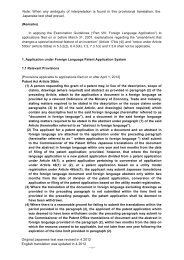Chapter 2 Novelty and Inventive Step - Japan Patent Office
Chapter 2 Novelty and Inventive Step - Japan Patent Office
Chapter 2 Novelty and Inventive Step - Japan Patent Office
Create successful ePaper yourself
Turn your PDF publications into a flip-book with our unique Google optimized e-Paper software.
Part II <strong>Chapter</strong> 2 <strong>Novelty</strong> <strong>and</strong> <strong>Inventive</strong> <strong>Step</strong><br />
since the French patent specification that has the same content as the claimed invention was<br />
received by the JPO Industrial Property Library prior to the filing of the application for patent of<br />
the invention, regardless of whether or not the invention was publicly disclosed at the time of<br />
filing the application.<br />
(Reference: Decision by the Supreme Court, Third Petty Bench, January 29, 1963<br />
[Showa 36 (O) 1180])<br />
[Example 2] The microfilm should be considered as a publication distributed in a foreign<br />
country prior to the filing of the application for the utility model since the public could refer to the<br />
content of the film by using a display screen <strong>and</strong> obtain a copy of it.<br />
(Reference: Decision by the Supreme Court, First Petty Bench, July 17, 1986<br />
[Showa 61 (Gyo Tsu) 18])<br />
(2) Determining a distributed point of time<br />
I. A distributed point of time is estimated as follows when a publication date has been<br />
indicated:<br />
(i) The last day of the year when only a publication year has been indicated;<br />
(ii) The last day of the month of the year when publication month <strong>and</strong> year have been indicated;<br />
<strong>and</strong><br />
(iii) The day, month <strong>and</strong> year when publication day, month <strong>and</strong> year have been indicated.<br />
II. A distributed point of time is estimated as follows when a publication date has not been<br />
indicated:<br />
(i) For foreign publications with an exact date when they were brought from abroad to <strong>Japan</strong>, the<br />
date retrospectively estimated from the date when the publications were brought from abroad to<br />
<strong>Japan</strong>, considering the period normally taken for shipping the publications from abroad to <strong>Japan</strong>;<br />
(ii) For publications compiled with other materials, such as book reviews, excerpts or catalogs,<br />
the publication date of the publication estimated from the publication dates of these materials;<br />
(iii) For reprinted publications, the initial print date if any; <strong>and</strong><br />
(iv) For other publications, the date estimated or acknowledged from other possible information<br />
source if any.<br />
III. A distributed point of time is determined as follows when a filing date <strong>and</strong> a publication<br />
date are the same date:<br />
When a filing date <strong>and</strong> a publication date are the same date, a distributed point of time is<br />
not deemed to be prior to the filing unless the filing is obviously after the publication.<br />
(3) Inventions that have been described in publications<br />
The expression "inventions described in publications" means inventions recognized from<br />
the descriptions in the publications or equivalents to such descriptions in the publications.<br />
The expression "equivalents to such descriptions" means those that persons can derive<br />
from the descriptions based on their common general knowledge Note as of the filing.<br />
Note: The term "common general knowledge" means obvious knowledge derived from the<br />
general knowledge or experience of a person skilled in the art, including well-known arts or<br />
commonly used arts.<br />
Also, the term "well-known arts" means the arts generally known in the technical field,<br />
such as those published in a significant number of documents <strong>and</strong> known in the field widely<br />
enough that it is not necessary to submit any examples of the arts. The term "commonly used<br />
3
















